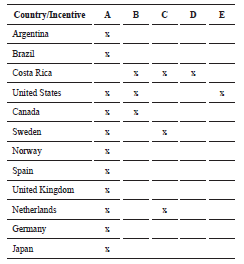Identification of economic incentives for the electrification of river and maritime modes: proposal for the Colombian Case
DOI:
https://doi.org/10.25043/19098642.236Keywords:
economic incentives, greenhouse gases, river transportation, maritime transportation, emission reductionsAbstract
The transportation sector's significant contribution to greenhouse gas (GHG) emissions, primarily through fossil fuel consumption by motorized vehicles, remains a critical concern. In this industry, maritime transportation independently contributes to 2.89% of total global greenhouse gas emissions, displaying a persistent upward trend even in the face of enhanced efficiency measures implemented in port facilities and vessel operations. In response to this urgent concern, nations and international organizations have been formulating approaches aimed at mitigating greenhouse gas emissions in this transportation sector, encompassing the implementation of economic incentives. This article presents the findings of an exploratory-descriptive research endeavor, which aims to identify incentive policies implemented across various countries to expedite the adoption of electromobility in maritime and river transportation, thereby reducing GHG emissions from vessels. Data was gathered from authorized government websites, various organizations, maritime and river transport companies, and port authorities in each respective nation. Furthermore, this study classifies the incentives according to their methodologies and conducts a comparative analysis with the existing landscape in Colombia regarding the adoption of economic incentives for electrifying river transportation within the country. Through this analysis, some insights and recommendations can be derived to promote sustainable and environmentally-friendly practices in Colombia's river and maritime transportation sectors.
Downloads
References
IMO (2020). Fourth IMO GHG Study 2020. Available at https://wwwcdn.imo.org/localresources/en/OurWork/Environment/Documents/Fourth%20IMO%20GHG%20Study%202020%20-%20Full%20report%20and%20annexes.pdf#page=252&zoom=100,0,0. [last visited 4 April 2022].
IEA (2022), Global Energy and Climate Model, IEA, Paris https://www.iea.org/reports/global-energy-and-climate-model, License: CC BY 4.0
Intergovernmental Panel on Climate Change (IPCC). (2021). IPCC Sixth Assessment Report: Climate Change 2021: The Physical Science Basis. Retrieved from https://zerocarbon-analytics.org/archives/science/ipcc-6th-assessment-report-physical-science-basis
MCKINSEY & COMPANY (2021). Why the automotive future is electric Available at https://www.mckinsey.com/industries/automotive-and-assembly/our-insights/why-the-automotive-future-is-electric. [last visited August 31, 2022].
UNITED NATIONS (sf). Fighting climate change. Available at: https://www.un.org/sustainabledevelopment/es/climate-change/. [last visited August 31, 2022].
BALCOMBE, P., BRIERLEY, J., LEWIS, C., SKATVEDT, L., SPEIRS, L, HAWKES, A. AND STAFFELL, I. (2029). How to decarbonise international shipping: Options for fuels, technologies and policies. Energy conversion and management, vol. 182, pp. 72-88, 2019. https://doi.org/10.1016/j.enconman.2018.12.080
XUAN, H. LIU, Q. WANG, L. AND YANG, L. (2022) Decision-Making on the Selection of Clean Energy Technology for Green Ships Based on the Rough Set and TOPSIS Method. Journal of Marine Science and Engineering, vol. 10, no. 5, p. 579, 2022. https://doi.org/10.3390/jmse10050579
KIM, K. (2022). Characteristics of Economic and Environmental Benefits of Shore Power Use by Container-Ship Size. Journal of Marine Science and Engineering, p. 622, 2022. https://doi.org/10.3390/jmse10050622
BACKER, H., KARI, E. AND KANTO, E. (2020) Economic incentives to promote environmentally friendly maritime transport in the Baltic Sea region. Finnish Transport and Communications Agency, 2020.
PORT OF STOCKHOLM (2022). Onshore power connection for vessels. Available at: https://www.portsofstockholm.com/about-us/environmental-work/environmental-measures/onshore-power-connection/. Last visited: 1 March 2022.
CAMARGO, C. P., PAIPA E., ZAPATA, J. A., AGUIRRE, Y., & QUIÑONES, E. E. (2022). A Review of Economic Incentives to Promote Decarbonization Alternatives in Maritime and Inland Waterway Transport Modes. Sustainability, 14(21), 14405. https://doi.org/10.3390/su142114405
BLUE ANGEL. (sf). Our label for the environment. Available at: https://www.blauer-engel.de/en/blue-angel/our-label-environment https://www.cleanshippingindex.com/. Last visited: 17 august 2022.
CLEAN SHIPPING INDEX (2022). Clean Shipping Index - For clean air and healthy oceans. Available at: https://www.cleanshippingindex.com/. Last visited: August 15, 2022.
GREEN AWARD (2022). List of Incentive Providers - Sea shipping. Available at: https://www.greenaward.org/sea-shipping/incentive-providers/list-of-incentive-providers/. Last visited: 17 January 2022.
ESI (2022). Green Wave Program For Shippers. Available at: https://www.rupertport.com/environmental-stewardship/green-wave-program-for-shippers/. Last visited: 17 January 2022.

Published
How to Cite
Issue
Section
License
Copyright (c) 2023 Cotecmar

This work is licensed under a Creative Commons Attribution 4.0 International License.
The authors who publish in this Journal certify that:
- The work submitted for publication in The Ship Science and Technology journal, was written by the author, given that its content is the product of his/her direct intellectual contribution.
- All data and references to material already published are duly identified with their respective credits and are included in the bibliographic notes and quotations highlighted as such.
- All materials submitted for publication are completely free of copyrights; consequently, the author accepts responsibility for any lawsuit or claim related with Intellectual Property Rights thereof, Exonerating of responsibility to The Science and Technology for the Development of Naval, Maritime, and Riverine Industry Corporation, COTECMAR.
- In the event that the article is chosen for publication by The Ship Science and Technology journal, the author state that he/she totally transfers reproduction rights of such to The Science and Technology for the Development of Naval, Maritime, and Riverine Industry Corporation, COTECMAR.
- The authors retain the copyright and transfer to COTECMAR the right of publication and reproduction of the work which will be simultaneously subject to the Creative Commons Attribution License (CC -BY) , which allows the license to copy, distribute, display and represent the work and to make derivative works as long as it recognizes and cites the work in the manner specified by the author or licensor.
- For more information about the Creative Commons Attribution License (CC -BY) and his use and scope, please visit the following web page https://creativecommons.org/licenses/by-sa/4.0/legalcode








